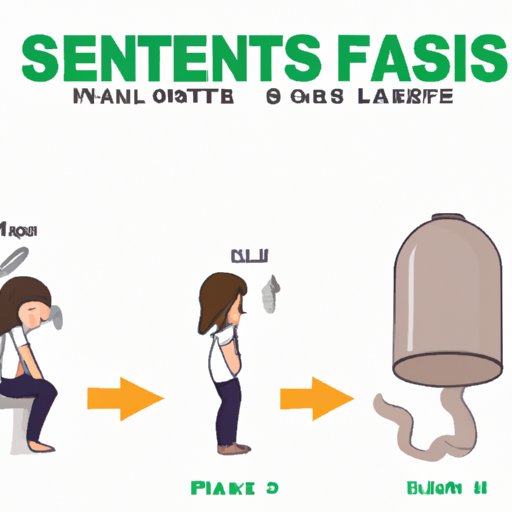
I. Introduction
Farts are a natural part of the human digestive process, yet many people still feel embarrassed or ashamed of letting them out. This article seeks to explore the physical and psychological consequences of holding in farts, as well as the social norms and cultural expectations surrounding flatulence. Whether you’re someone who rarely passes gas or someone who is inclined to hold it in, this article is for you.

II. The Physical Effects of Holding in Farts: Why Silent But Deadly Can Be Harmful
When we eat, our bodies break down the food into nutrients and waste products. Gas is one of those waste products, and it’s produced when the food moves through the digestive system. While it’s normal to pass gas around 10 to 20 times a day, some people may be inclined to hold it in, especially in social or professional settings. However, holding in gas can have some physical consequences.
For one, holding in gas can cause bloating, as the gas builds up in the intestines and creates pressure. This can be particularly uncomfortable and even painful. In some cases, holding in gas for extended periods of time can damage the intestinal wall and lead to medical complications, such as diverticulitis or even perforation.
III. The Psychological Toll of Suppressing Gas: A Look into the Embarrassment of Farting
While holding in gas can have physical consequences, there are also social and cultural pressures that contribute to the embarrassment of farting. Farting is often considered taboo and socially unacceptable, leading people to feel ashamed or embarrassed about passing gas.
However, suppressing gas can also have psychological consequences. Holding in gas can cause feelings of discomfort, self-consciousness, and even anxiety. In some cases, people may develop psychological conditions, such as irritable bowel syndrome or social anxiety, as a result of their fear of passing gas in public.
To combat these feelings, it is important to challenge cultural and societal expectations surrounding flatulence. Farting is a natural part of bodily function, and there should be no shame or embarrassment attached to it. It’s important to remember that everyone passes gas, and it’s nothing to be ashamed of.
IV. To Fart or Not to Fart: Exploring the Social Norms of Flatulence
The social norms surrounding flatulence can vary depending on culture and situation. In some cultures, farting is not frowned upon and is even seen as humorous or an everyday part of life. However, in other cultures, farting can be considered taboo and rude, leading people to suppress their gas in public settings.
When navigating social situations where farting may feel uncomfortable or disrespectful, it’s important to be mindful and respectful of others. If possible, excuse yourself to a private area to pass gas. If you do let out a fart in public, it’s important to acknowledge it with a simple “excuse me” or by laughing it off.
V. When Gas Gets Trapped: The Possible Medical Consequences of Holding in Farts
While holding in gas may seem harmless, there are some medical complications that can arise if gas retention becomes persistent or painful. One such complication is fecal impaction, which is the accumulation of hardened stool in the rectum, leading to the blockage of gas and waste products. This can cause severe discomfort and even lead to medical intervention.
Another potential complication is a condition called volvulus, which is when the intestine twists upon itself, causing trapped gas and waste products. This can lead to severe abdominal pain and can become life-threatening if untreated.
If you are experiencing persistent bloating or discomfort due to holding in gas, it’s important to seek medical attention. Your doctor may be able to offer solutions or treatments to help you pass gas more comfortably and reduce the risk of medical complications.
VI. The Science of Farting: How Our Bodies Produce Gas and What Happens When We Hold It In
When we eat, our bodies break down the food into nutrients, and waste products. Gas is one of those waste products, and it’s produced when the food moves through the digestive system. The majority of the gas produced is composed of hydrogen, nitrogen, carbon dioxide, and small amounts of methane and hydrogen sulfide.
When we hold in gas, the gas can continue to build up in the intestines, leading to discomfort, bloating, and potential medical complications. Additionally, holding in gas for extended periods of time can lead to decreased anal sphincter tone, which can make it harder to pass gas in the future.
VII. Embracing Flatulence: Why We Should Stop Suppressing Our Natural Bodily Functions
While passing gas may not always be socially acceptable or comfortable in public settings, there are great benefits to embracing bodily functions like farting. For one, passing gas is a natural part of the digestive process, and there’s nothing inherently wrong with it. By embracing our natural bodily functions, we can reduce feelings of discomfort and anxiety surrounding flatulence.
Additionally, embracing flatulence can actually provide some mental and physical health benefits. Passing gas can relieve pressure and discomfort in the abdomen, and reducing feelings of shame or embarrassment can help to improve overall mental health and wellbeing.
Ultimately, the key to embracing flatulence is to let go of societal expectations and to focus on accepting our bodies for what they are. It’s okay to pass gas, and it’s okay to feel uncomfortable about it at times. By being kind to ourselves and to others, we can all live healthier, happier lives.
VIII. Conclusion
In conclusion, while holding in farts may seem like a harmless choice, it can actually have physical and psychological consequences. The social stigmas surrounding flatulence can lead to feelings of discomfort and shame, but it’s important to challenge these norms and embrace our natural bodily functions.
If you’re struggling with holding in gas, it’s important to seek medical attention and to find ways to reduce feelings of shame or embarrassment. Ultimately, by being kind to ourselves and to others, we can live healthier, happier lives, free of the unnecessary shame and anxiety surrounding flatulence.





